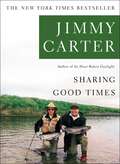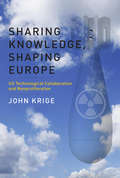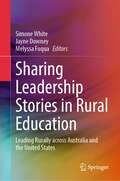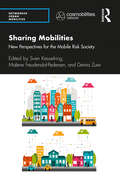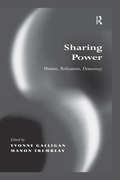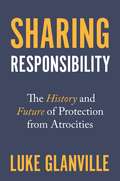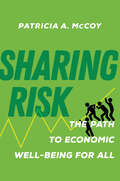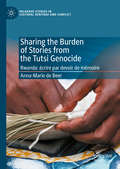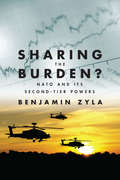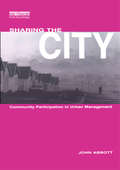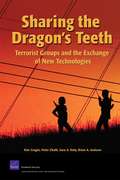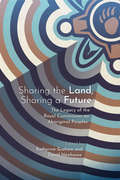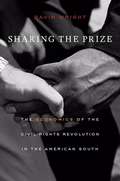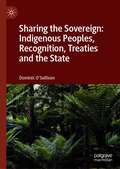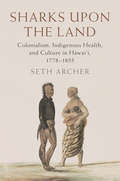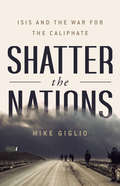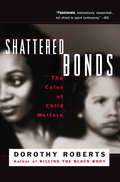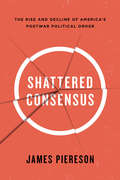- Table View
- List View
Sharing Good Times
by Jimmy CarterIn this wonderfully evocative volume, following the outstanding success of The Hornet's Nest, Christmas in Plains, and his classic, An Hour Before Daylight, Jimmy Carter writes about the things that matter most, the simple relaxed days and nights that he has enjoyed with family and friends through the years and across generations. Here are lively and witty accounts of exploring the outdoors with his father and with black playmates; making furniture; painting; pursuing new adventures and going places with children, grandchildren, and friends. He describes how he learned to share life with his wife, Rosalynn -- and how they both learned how to grant each other personal space -- and to compete with her on the tennis court, high mountains, trout streams, and ski slopes. These lifetime experiences can be an inspirational guide to anyone desiring to stretch mind and heart and to combine work and pleasure.
Sharing Knowledge, Shaping Europe: US Technological Collaboration and Nonproliferation (Transformations: Studies in the History of Science and Technology)
by John KrigeHow America used its technological leadership in the 1950s and the 1960s to foster European collaboration and curb nuclear proliferation, with varying degrees of success.In the 1950s and the 1960s, U.S. administrations were determined to prevent Western European countries from developing independent national nuclear weapons programs. To do so, the United States attempted to use its technological pre-eminence as a tool of “soft power” to steer Western European technological choices toward the peaceful uses of the atom and of space, encouraging options that fostered collaboration, promoted nonproliferation, and defused challenges to U.S. technological superiority. In Sharing Knowledge, Shaping Europe, John Krige describes these efforts and the varying degrees of success they achieved. Krige explains that the pursuit of scientific and technological leadership, galvanized by America's Cold War competition with the Soviet Union, was also used for techno-political collaboration with major allies. He examines a series of multinational arrangements involving shared technological platforms and aimed at curbing nuclear proliferation, and he describes the roles of the Department of State, the Atomic Energy Commission, and NASA. To their dismay, these agencies discovered that the use of technology as an instrument of soft power was seriously circumscribed, by internal divisions within successive administrations and by external opposition from European countries. It was successful, Krige argues, only when technological leadership was embedded in a web of supportive “harder” power structures.
Sharing Leadership Stories in Rural Education: Leading Rurally across Australia and the United States
by Simone White Jayne Downey Melyssa FuquaThis book brings together the two fields of ‘educational leadership’ and ‘rurality’ and builds on the growing field of inquiry into the significance of ‘adding the rural’ to all aspects of education. It explores the vibrancy and variety of opportunities and challenges that are met by rural education leaders and researchers from two particular countries, Australia and the United States. It illuminates and explores the concept of rural leadership and take an educational stance, shedding light into what it means to lead rurally for educational policy, research, schools, communities and for the next generation of rural leaders themselves. It presents stories from the field with insights into capabilities, approaches, models and strategies for improving practice and outcomes. In addition to adding to the international bodies of knowledge, this volume contributes to advancements in educational leadership theories, as well as expands understanding of requisite knowledge and skills as informed by the distinct circumstances and affordances of rural contexts. This book also explores the construct of service, and explores ways in which it has been infused in various rural education leadership contexts.
Sharing Mobilities: New Perspectives for the Mobile Risk Society (Networked Urban Mobilities Series)
by Dennis Zuev Sven Kesselring Malene Freudendal-PedersenSharing Mobilities focuses on the emergence of future sustainable and collaborative mobility cultures. At the intersection of physical and virtual capacity and access to people, goods, ideas, and services, this book poses fundamental challenges and opportunities for governance, economy, planning, and identity. The future of new collaborative forms of consumption and sharing would play a key role in the organization of everyday life and business. Sharing mobilities is more than simply sharing transport, and its diverse impacts on society and the environment demand thorough theory-led sociological research. With an extensive global range, the contributors present radical manifestations of sharing capacities throughout diverse countries, including Germany, Denmark, Japan, and Vietnam. The phenomenon of mobility is highly actual and social as well as politically relevant and urging. This collection focuses on open questions from the perspective of the mobilities turn while presenting state-of-the-art theory-based articles with applied perspectives. An ideal read for scholars based in social science and the interdisciplinary research on mobility, transports, and sharing economy. Sociologists, geographers, economists, urban governance researchers, and research students would also find this book of interest.
Sharing Power, Securing Peace?: Ethnic Inclusion and Civil War
by Simon Hug Lars-Erik Cederman Julian WucherpfennigDoes power sharing bring peace? Policymakers around the world seem to think so. Yet, while there are many successful examples of power sharing in multi-ethnic states, such as Switzerland, South Africa and Indonesia, other instances show that such arrangements offer no guarantee against violent conflict, including Rwanda, Yugoslavia, Zimbabwe and South Sudan. Given this mixed record, it is not surprising that scholars disagree as to whether power sharing actually reduces conflict. Based on systematic data and innovative methods, this book comes to a mostly positive conclusion by focusing on practices rather than merely formal institutions, studying power sharing's preventive effect, analyzing how power sharing is invoked in anticipation of conflict, and by showing that territorial power sharing can be effective if combined with inclusion at the center. The authors' findings demonstrate that power sharing is usually the best option to reduce and prevent civil conflict in divided states.
Sharing Power: Women, Parliament, Democracy
by Manon TremblayThe representation of women in parliament is a subject of extensive research and a focus for political action in the last decade. The wide variation in women's parliamentary presence contradicts the expectation that established or consolidated democracies are more supportive of the presence of women in political life than emerging democracies. This volume explains this variation through a series of closely investigated case studies from the post-Communist transition democracies of Eastern Europe and emerging democracies in Asia and the Middle East to the long-established liberal democratic states. The volume examines the history of women's legislative involvement, clearly addressing the issue of equal opportunities for women in political life on a cross-national basis. It also identifies innovative solutions to redress the power-sharing balance between women and men. Offering a unique comparative perspective, Sharing Power will appeal to students and scholars of politics, women's studies, history and legislative studies.
Sharing Responsibility: The History and Future of Protection from Atrocities (Human Rights and Crimes against Humanity #43)
by Luke GlanvilleA look at the duty of nations to protect human rights beyond borders, why it has failed in practice, and what can be done about itThe idea that states share a responsibility to shield people everywhere from atrocities is presently under threat. Despite some early twenty-first century successes, including the 2005 United Nations endorsement of the Responsibility to Protect, the project has been placed into jeopardy due to catastrophes in such places as Syria, Myanmar, and Yemen; resurgent nationalism; and growing global antagonism. In Sharing Responsibility, Luke Glanville seeks to diagnose the current crisis in international protection by exploring its long and troubled history. With attention to ethics, law, and politics, he measures what possibilities remain for protecting people wherever they reside from atrocities, despite formidable challenges in the international arena.With a focus on Western natural law and the European society of states, Glanville shows that the history of the shared responsibility to protect is marked by courageous efforts, as well as troubling ties to Western imperialism, evasion, and abuse. The project of safeguarding vulnerable populations can undoubtedly devolve into blame shifting and hypocrisy, but can also spark effective burden sharing among nations. Glanville considers how states should support this responsibility, whether it can be coherently codified in law, the extent to which states have embraced their responsibilities, and what might lead them to do so more reliably in the future.Sharing Responsibility wrestles with how countries should care for imperiled people and how the ideal of the responsibility to protect might inspire just behavior in an imperfect and troubled world.
Sharing Risk: The Path to Economic Well-Being for All
by Patricia A. McCoyExamining why society should pool and spread the financial risk that individual families now bear. Over the past sixty years, businesses and government have increasingly off-loaded financial risk onto US households. The toll has pushed tens of millions of people to the financial breaking point, worsened social inequity, and jeopardized US democracy. In Sharing Risk, consumer advocate and scholar Patricia A. McCoy draws on the nation’s traditions of risk sharing to argue that society should lift up families by pooling and spreading the financial risks that they now must bear alone. Most policy discussions of financial stress on households look at the milestones of economic well-being in isolation: making ends meet, homeownership, quality health care, financing college, and a secure retirement. McCoy offers the first integrated examination of how risk sharing can enable families to realistically achieve all five goals without sacrificing one for another. She makes specific policy recommendations and shows how risk sharing, with its long and venerable history that includes Social Security and the Affordable Care Act, would provide economic well-being for all.
Sharing the Burden of Stories from the Tutsi Genocide: Rwanda: écrire par devoir de mémoire (Palgrave Studies in Cultural Heritage and Conflict)
by Anna-Marie de BeerThis book deals with literary representations of the genocide of the Tutsis in Rwanda. The focus is a transnational, polyphonic writing project entitled ‘Rwanda: écrire par devoir de mémoire’ (Rwanda: Writing by Duty of Memory), undertaken in 1998 by a group of nine African authors. This work emphasizes the Afropolitan cultural frame in which the texts were conceived and written. Instead of using Western and Eurocentric tropes, this volume looks at a so-called ‘minority trauma’: an African conflict situated in a collectivist society and written about by writers from African origin. This approach enables a more situated study, in which it becomes possible to draw out the local notions of ubuntu, oral testimonies, mourning traditions, healing and storytelling strategies, and the presence of the ‘invisible’. As these texts are written in French and to date not all of them have been translated into English, most academic research has been done in French. This book thus assists in connecting English-speaking readers not only to a set of texts written in French with significant literary and cultural value, but also to francophone trauma studies research.
Sharing the Burden?
by Benjamin ZylaSince the fall of the Berlin Wall, NATO's middle powers have been pressured into shouldering an increasing share of the costs of the transatlantic alliance. In Sharing the Burden? Benjamin Zyla rejects the claim that countries like Canada have shirked their responsibilities within NATO.Using a range of measures that go beyond troop numbers and defense budgets to include peacekeeping commitments, foreign economic assistance, and contributions to NATO's rapid reaction forces and infrastructure, Zyla argues that, proportionally, Canada's NATO commitments in the 1990s rivaled those of the alliance's major powers. At the same time, he demonstrates that Canadian policy was driven by strong normative principles to assist failed and failing states rather than a desire to ride the coattails of the United States, as is often presumed.An important challenge to realist theories, Sharing the Burden? is a significant contribution to the debate on the nature of alliances in international relations.
Sharing the City: Community Participation in Urban Management
by John AbbottWhile the rate of urbanisation in the developing world has increased dramatically over the past 20 years, governments' capacity to support urban growth has, in many cases, failed to keep up with this trend. Non-governmental organisations working in the field have long advocated community management of the urban environment as the best solution to this problem, and there is now a growing consensus that the answer does, indeed, lie with local communities. Yet there is still little understanding of what constitutes meaningful and effective community participation, or how it may be achieved in such a complex operating environment. Sharing the City gives a comprehensive account of urban community participation, both in theory and practice. It first presents a wide-ranging analysis of the issues, and develops a participatory framework for urban management. Using case studies and existing examples from around the world, and drawing on lessons learned from previous experience, it then develops the theory into a practical working model. Effective participatory urban management calls for a fundamental rethink on the part of all the actors involved - from local authorities and development agencies, through local and international NGOs, to the community-based organisations and the communities themselves. In redefining their roles and relationships, Sharing the City presents a new and radically different, yet viable and effective, approach to the concept of urban management.
Sharing the Dragon's Teeth: Terrorist Groups and the Exchange of New Technologies
by Peter Chalk Sara A. Daly Kim Cragin Brian A. JacksonCase studies of 11 terrorist groups in Mindanao, the West Bank and Gaza Strip, and southwest Colombia show how these groups have exchanged technologies and knowledge in an effort to innovate (i.e., improve their operational capabilities). The analysis provides national security policymakers with insight into the innovation process and suggests ways that government policies can create barriers to terrorists' adoption of new technologies.
Sharing the Land, Sharing a Future: The Legacy of the Royal Commission on Aboriginal Peoples (Perceptions on Truth and Reconciliation #4)
by Edited by Katherine A.H. Graham and David Newhouse"Sharing the Land, Sharing a Future" looks to both the past and the future as it examines the foundational work of the Royal Commission on Aboriginal Peoples (RCAP) and the legacy of its 1996 report. It assesses the Commission’s influence on subsequent milestones in Indigenous-Canada relations and considers our prospects for a constructive future. RCAP’s five-year examination of the relationships of First Nations, Metis, and Inuit peoples to Canada and to non-Indigenous Canadians resulted in a new vision for Canada and provided 440 specific recommendations, many of which informed the subsequent work of the Truth and Reconciliation Commission of Canada (TRC). Considered too radical and difficult to implement, RCAP’s recommendations were largely ignored, but the TRC reiterates that longstanding inequalities and imbalances in Canada’s relationship with Indigenous peoples remain and quite literally calls us to action. With reflections on RCAP’s legacy by its co-chairs, leaders of national Indigenous organizations and the Minister of Crown-Indigenous Relations, and leading academics and activists, this collection refocuses our attention on the groundbreaking work already performed by RCAP. Organized thematically, it explores avenues by which we may establish a new relationship, build healthy and powerful communities, engage citizens, and move to action.
Sharing the Prize
by Gavin WrightThe civil rights movement was also a struggle for economic justice, one that until now has not had its own history. Sharing the Prize demonstrates the significant material gains black southerners made-in improved job opportunities, quality of education, and healthcare-from the 1960s to the 1970s and beyond. Because black advances did not come at the expense of southern whites, Gavin Wright argues, the civil rights struggle was that rarest of social revolutions: one that benefits both sides. From the beginning, black activists sought economic justice in addition to full legal rights. The southern bus boycotts and lunch counter sit-ins were famous acts of civil disobedience, but they were also demands for jobs in the very services being denied blacks. In the period of enforced desegregation following the passage of the Civil Rights Act of 1964 and the Voting Rights Act of 1965, the wages of southern black workers increased dramatically. Wright’s painstaking documentation of this fact undermines beliefs that government intervention was unnecessary, that discrimination was irrational, and that segregation would gradually disappear once the market was allowed to work. Wright also explains why white southerners defended for so long a system that failed to serve their own best interests. Sharing the Prize makes clear that the material benefits of the civil rights acts of the 1960s are as significant as the moral ones-an especially timely achievement as these monumental pieces of legislation, and the efficacy of governmental intervention more broadly, face new challenges.
Sharing the Sovereign: Indigenous Peoples, Recognition, Treaties and the State
by Dominic O'SullivanThis book explains how recognition theory contributes to non-colonial and enduring political relationships between Indigenous nations and the state. It refers to Indigenous Australian arguments for a Voice to Parliament and treaties to show what recognition may mean for practical politics and policy-making. It considers critiques of recognition theory by Canadian First Nations’ scholars who make strong arguments for its assimilationist effect, but shows that ultimately, recognition is a theory and practice of transformative potential, requiring fundamentally different ways of thinking about citizenship and sovereignty. This book draws extensively on New Zealand’s Treaty of Waitangi and measures to support Maori political participation, to show what treaties and a Voice to Parliament could mean in practical terms. It responds to liberal democratic objections to show how institutionalised means of indigenous participation may, in fact, make democracy work better.
Sharks Upon the Land: Colonialism, Indigenous Health, and Culture in Hawai'i, 1778-1855 (Studies In North American Indian History )
by Seth ArcherHistorian Seth Archer traces the cultural impact of disease and health problems in the Hawaiian Islands from the arrival of Europeans to 1855. Colonialism in Hawaiʻi began with epidemiological incursions, and Archer argues that health remained the national crisis of the islands for more than a century. Introduced diseases resulted in reduced life spans, rising infertility and infant mortality, and persistent poor health for generations of Islanders, leaving a deep imprint on Hawaiian culture and national consciousness. Scholars have noted the role of epidemics in the depopulation of Hawaiʻi and broader Oceania, yet few have considered the interplay between colonialism, health, and culture – including Native religion, medicine, and gender. This study emphasizes Islanders’ own ideas about, and responses to, health challenges on the local level. Ultimately, Hawaiʻi provides a case study for health and culture change among Indigenous populations across the Americas and the Pacific.
Sharks in the Arts: From Feared to Revered (Routledge Environmental Humanities)
by Dean Crawford Mark Nicholls Vivienne Westbrook Shaun CollinThis book is the most thorough exploration to date of the many ways in which a wild creature has been absorbed, reimagined and represented across the ages in all of the major art forms. The authors consider not only how the identity of sharks in the natural environment became incorporated into a cultural environment but also how sharks came to be considered the most feared creatures in the open oceans as a consequence of this incorporation. Yet sharks are especially important in helping to maintain a balance that is essential to the health of the oceans. The book begins with a treatment of the three sharks at the top of global shark-attack files from scientific, economic and environmental perspectives. Subsequent chapters engage with cultural representations of sharks in poetry, drama, art, novels, screenplay adaptations and films. Through an exploration of the ways in which sharks have been represented in human culture through the centuries, this book alerts the global community to the importance of sharks as a common cultural heritage. It aims to change perceptions of sharks so that they can become more revered than feared. The authors of this book argue that an increased understanding of sharks should lead to the development of better strategies for shark and human interactions. This book will be of great interest to researchers and students of the Environmental Humanities, Cultural History and the Arts. It is also excellent supplementary reading for courses in Zoology and Marine Science.
Sharon: Israel's Warrior-Politician
by Anita Miller Jordan Miller Sigalit ZetouniAriel Sharon, Israel's former Prime Minister, was perhaps one of the most controversial public figures in the Mideast.He was born in 1928 in a moshav--an agricultural community in which, unlike a kibbutz, residents own their own property--and was raised by parents who were not only ardent Zionists but also rugged individualists. His father especially was contemptuous of socialism and believed in individual enterprise, raising his son to be self-reliant and physically strong in order to prepare him for the inevitable struggle to establish a Jewish state.Sharon was perhaps best known as the organizer of what was called Commando Unit 101 and for his original ideas for the training of commando forces, which he later adapted to the training of larger, more traditional armies. During his military career he personally led many raids into Arab territory and has been criticized for his role in the destruction, in 1953, of some forty Arab homes--which he insisted he thought were empty and in which sixty-nine Arabs died. Later, in 1982, he was blamed also for allowing the Lebanese Christian Militia into a Palestinian refugee camp in which hundreds were killed.His political career was of course indelibly colored by his military exploits. What made Sharon tick? What kind of a man was he? How did his childhood and early life condition him to become a brilliant commander, controversial soldier and an as-yet-untested leader of a small democracy which is divided both within and without? This first biography in English--frank, but balanced--will perhaps answer some of the questions raised by his career both as a soldier and politician.
Sharon: The Life of a Leader
by Gilad SharonDrawn from extensive personal archives and filled withstartling revelations, the definitive biography of Ariel Sharon illuminates hislife and work from the penetrating perspective of his youngest son, Gilad Sharon—one of his father’s closest confidants.Readers of George W. Bush’s Decision Points, Tony Blair’s A Journey,Yitzhak Rabin’s The Rabin Memoirs, and Moshe Dayan’s Story of My Life,as well as Benjamin Netanyahu’s A Durable Peace, will be fascinated by Gilad Sharon’s piercing, authoritative, and intimateportrait of Ariel Sharon the Prime Minister, the father, and the military hero,in a narrative that traces his evolution into a powerful and influential forceat the center of Middle Eastern and world politics.
Sharpe's Battle: The Battle of Fuentes de Onoro, May 1811 (Sharpe #12)
by Bernard CornwellFrom New York Times bestselling author Bernard Cornwell, the twelth installment in the world-renowned Sharpe series, chronicling the rise of Richard Sharpe, a Private in His Majesty’s Army at the siege of Seringapatam. Quartered in a crumbling Portuguese fort, Richard Sharpe and his men are attacked by an elite French unit, led by an old enemy of Sharpe’s, and suffer heavy losses.The army’s high command blame Sharpe for the disaster and his military career seems to be ruined. His only hope is to redeem himself on the battlefield. So with his honour at stake, against an overwhelming number of French troops, Sharpe leads his men to battle in the narrow streets of Fuentes de Oñoro.
Sharpe's Devil: Napoleon and South America, 1820-1821 (Sharpe #23)
by Bernard CornwellFrom New York Times bestselling author Bernard Cornwell, another exciting adventure in the world-renowned Sharpe series, chronicling the rise of Richard Sharpe, a Private in His Majesty’s Army at the siege of Seringapatam. Five years after the Battle of Waterloo, Sharpe’s peaceful retirement in Normandy is shattered. An old friend, Don Blas Vivar, is missing in Chile, reported dead at rebel hands – a report his wife refuses to believe. She appeals to Sharpe to find out the truth.Sharpe, along with Patrick Harper, find themselves bound for Chile via St. Helena, where they have a fateful meeting with the fallen Emperor Napoleon. Convinced that they are on their way to collect a corpse, neither man can imagine that dangers that await them in Chile…
Sharpe's Fury: Richard Sharpe and the Battle of Barrosa, March 1811 (Sharpe #11)
by Bernard CornwellFrom New York Times bestselling author Bernard Cornwell, the eleventh installment in the world-renowned Sharpe series, chronicling the rise of Richard Sharpe, a Private in His Majesty’s Army at the siege of Seringapatam. In the winter of 1811, the war seems lost. Spain has fallen to the French, except for Cadiz, now the Spanish capital and itself under siege. Inside the city walls an intricate diplomatic dance is taking place and Richard Sharpe faces more than one enemy.The small British force is trapped by a French army, and their only hope lies with the outnumbered redcoats outside refusing to admit defeat. There, in the sweltering horror of Barrosa, Sharpe will meet his old enemy Colonel Vandal once again.
Shatter the Nations: ISIS and the War for the Caliphate
by Mike GiglioUnflinching dispatches of an embedded war reporter covering ISIS and the unlikely alliance of forces who came together to defeat it.The battle to defeat ISIS was an unremittingly brutal and dystopian struggle, a multi-sided war of gritty local commandos and militias. Mike Giglio takes readers to the heart of this shifting, uncertain conflict, capturing the essence of a modern war.At its peak, ISIS controlled a self-styled "caliphate" the size of Great Britain, with a population cast into servitude that numbered in the millions. Its territory spread across Iraq and Syria as its influence stretched throughout the wider world.Giglio tells the story of the rise of the caliphate and the ramshackle coalition--aided by secretive Western troops and American airstrikes--that was assembled to break it down village by village, district by district. The story moves from the smugglers, traffickers, and jihadis working on the ISIS side to the victims of its zealous persecution and the local soldiers who died by the thousands to defeat it. Amid the battlefield drama, culminating in a climactic showdown in Mosul, is a dazzlingly human portrait of the destructive power of extremism, and of the tenacity and astonishing courage required to defeat it.
Shattered Bonds: The Color Of Child Welfare
by Dorothy RobertsShattered Bonds is a stirring account of a worsening American social crisis--the disproportionate representation of black children in the U. S. foster care system and its effects on black communities and the country as a whole. Tying the origins and impact of this disparity to racial injustice, Dorothy Roberts contends that child-welfare policy reflects a political choice to address startling rates of black child poverty by punishing parents instead of tackling poverty's societal roots. Using conversations with mothers battling the Chicago child-welfare system for custody of their children, along with national data, Roberts levels a powerful indictment of racial disparities in foster care and tells a moving story of the women and children who earn our respect in their fight to keep their families intact.
Shattered Consensus
by James PieresonThe United States has been shaped by three sweeping political revolutions: Jefferson's "revolution of 1800," the Civil War, and the New Deal. Each of these upheavals concluded with lasting institutional and cultural adjustments that set the stage for a new phase of political and economic development. Are we on the verge of another upheaval, a "fourth revolution" that will reshape U.S. politics for decades to come? There are signs to suggest that we are. James Piereson describes the inevitable political turmoil that will overtake the United States in the next decade as a consequence of economic stagnation, the unsustainable growth of government, and the exhaustion of postwar arrangements that formerly underpinned American prosperity and power. The challenges of public debt, the retirement of the "baby boom" generation, and slow economic growth have reached a point where they require profound changes in the role of government in American life. At the same time, the widening gulf between the two political parties and the entrenched power of interest groups will make it difficult to negotiate the changes needed to renew the system.Shattered Consensus places this impending upheaval in historical context, reminding readers that Americans have faced and overcome similar trials in the past, in relatively brief but intense periods of political conflict. While others claim that the United States is in decline, Piereson argues that Americans will rise to the challenge of forming a new governing coalition that can guide the nation on a path of dynamism and prosperity.
